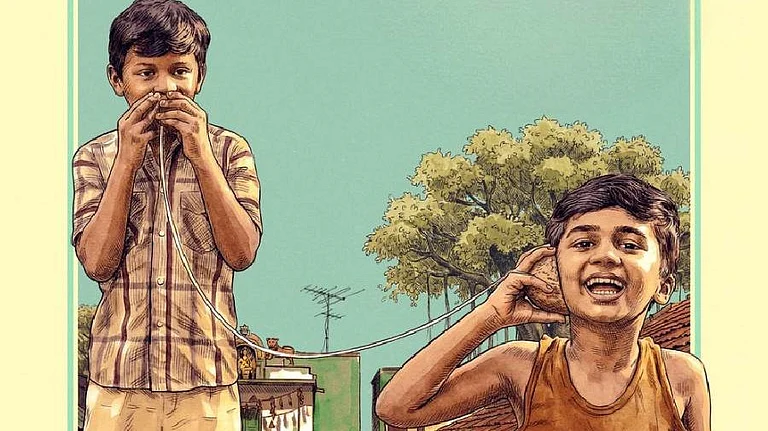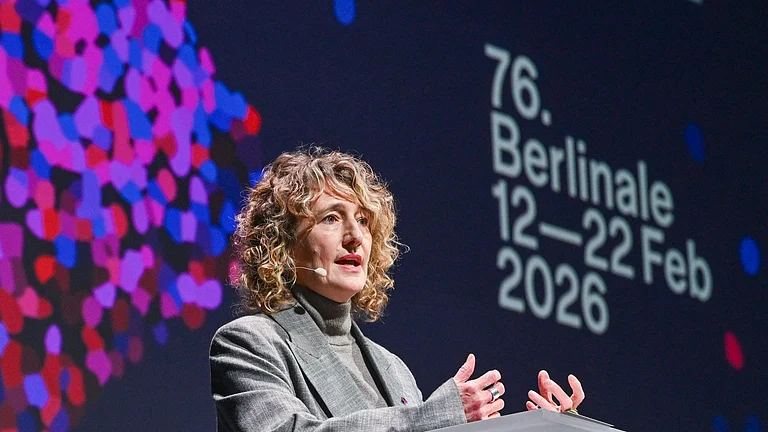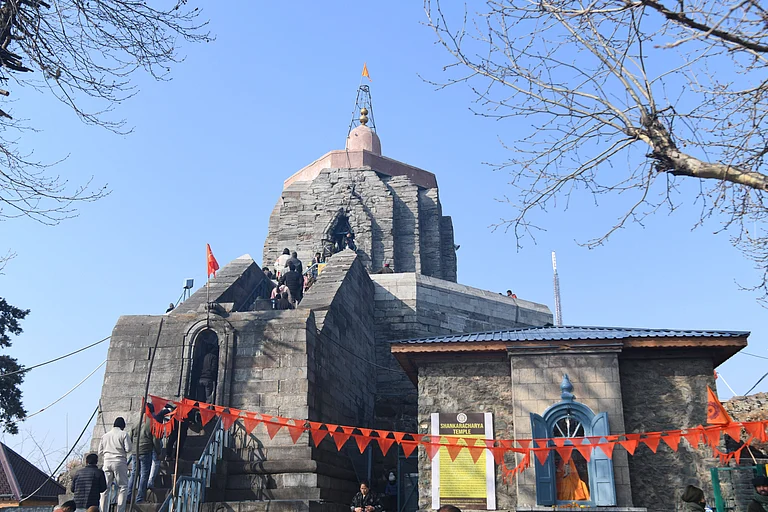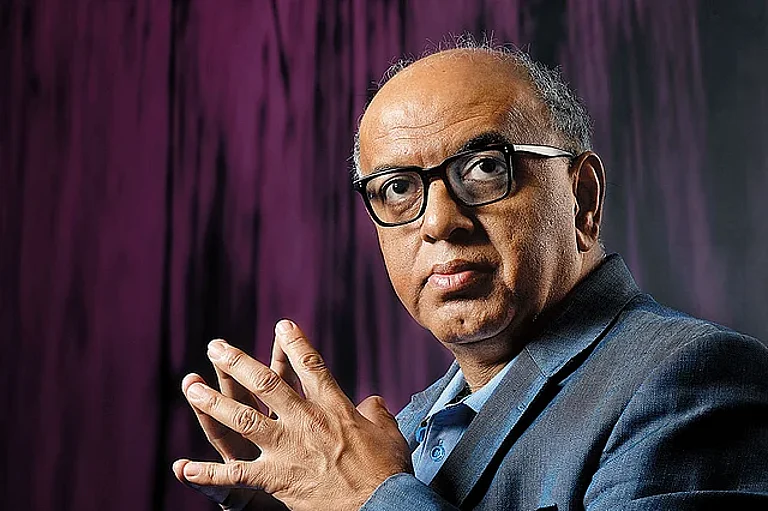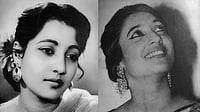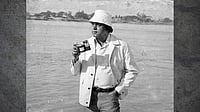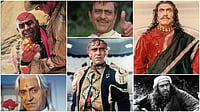
November 6 marks actor Sanjeev Kumar's 40th death anniversary.
Beginning his career on the IPTA stage, Sanjeev Kumar featured in Outlook India’s list of ‘75 Best Bollywood Actors’ in 2022.
Sanjeev Kumar won the National Film Award for 'Best Actor' twice, for his roles in Dastak (1970) and Koshish (1972).
“Hari Bhai had an odd habit—he was never satisfied with the first take, even when it was perfect,” shares HK Verma, the cinematographer of his 1980 Punjabi film, Fauji Chacha. The film, produced by and co-starring Dheeraj Kumar, had Hari Bhai (his original name was Harihar Jethalal Jariwala) aka Sanjeev Kumar in the title role.
It was an emotional scene and the actor’s performance was so moving that the entire unit had fallen silent. But he himself wasn’t satisfied. “Let’s take one more, I blinked too much,” he urged director Dharam Kumar.
He went on to give four more takes, each one just as brilliant. “When I finally told him, ‘You blink less than the camera shutter,’ he laughed and said, ‘Then the camera should learn acting from me.’ That was Hari Bhai—obsessive, but with a twinkle,” recounts Verma.

Talking of retakes, Ashoke Pandit, who assisted director Raman Kumar through the making of his 1987 film Raahee, recalls that during the shooting of a song, Kumar had to walk towards Smita Patil while she had to move towards Shatrughan Sinha. It was a long shot with the cinematographer, Sunil Sharma, who was sitting high up above them on the rafters of the studio, zooming in on the trio.
The shot was okayed to everyone’s satisfaction, when Kumar suddenly piped up, asking for “one more take”. The director was reluctant because back then, they were still shooting on celluloid film, which was expensive. However, the actor looked up and pointed out to the DoP that instead of holding on till the end of the beat, his Zoom stick had come down a few seconds earlier.
“The observation stunned everyone because had the out-of-sync shot been okayed, it would have created problems for Raman ji during the editing of the film. It was incredible that while performing, Hari Bhai even had his eyes on the cameraman, who was perched high above him. That’s the hallmark of not just a good actor, but a great one,” raves Pandit.

Beginning his career on the IPTA stage, Sanjeev Kumar featured in Outlook India’s list of ‘75 Best Bollywood Actors’ in 2022. One remembers his brilliance in so many films, from Gulzar’s Anubhav (1971), Parichay (1972), Koshish (1972), Aandhi (1975), Mausam (1975), Devata (1978, written by him and directed by S Ramanathan), Angoor (1982) and Namkeen (1982)—all diversely different performances—to the vengeful Thakur in Ramesh Sippy’s Sholay (1975). Yash Chopra’s Trishul (1978), which remains memorable for his clash with ‘son’ Amitabh Bachchan, the philandering husband in BR Chopra’s Pati Patni Aur Woh (1978) and of course, the nine different roles he played in A Bhimsingh’s Naya Din Nayi Raat (1974) were among his many other gems. When he was on screen, one just gazed at him, mesmerised—because no matter what the genre, what the role, what the shade of emotion, he excelled every time.
Sanjeev Kumar silenced everyone with Koshish (1972), in which Jaya Bhaduri and he play a deaf-mute couple. The performance fetched him his second National Film Award for ‘Best Actor’ in 1973. The first had come two years earlier, for his portrayal of Hamid in Rajinder Singh Bedi’s directorial debut Dastak (1970), revolving around a newly wed Muslim couple, whose conjugal life in Maximum City turns hellish after they rent out an apartment inhabited by a mujrewali earlier. The modestly mounted black-and-white film also bagged Rehana Sultan, who plays his wife Salma, the award for ‘Best Actress’, while composer Madan Mohan was felicitated for ‘Best Music Direction’. Years later, his leading lady revealed that he had visited her home twice, to savour the paaya which was Rehana’s mother’s speciality.
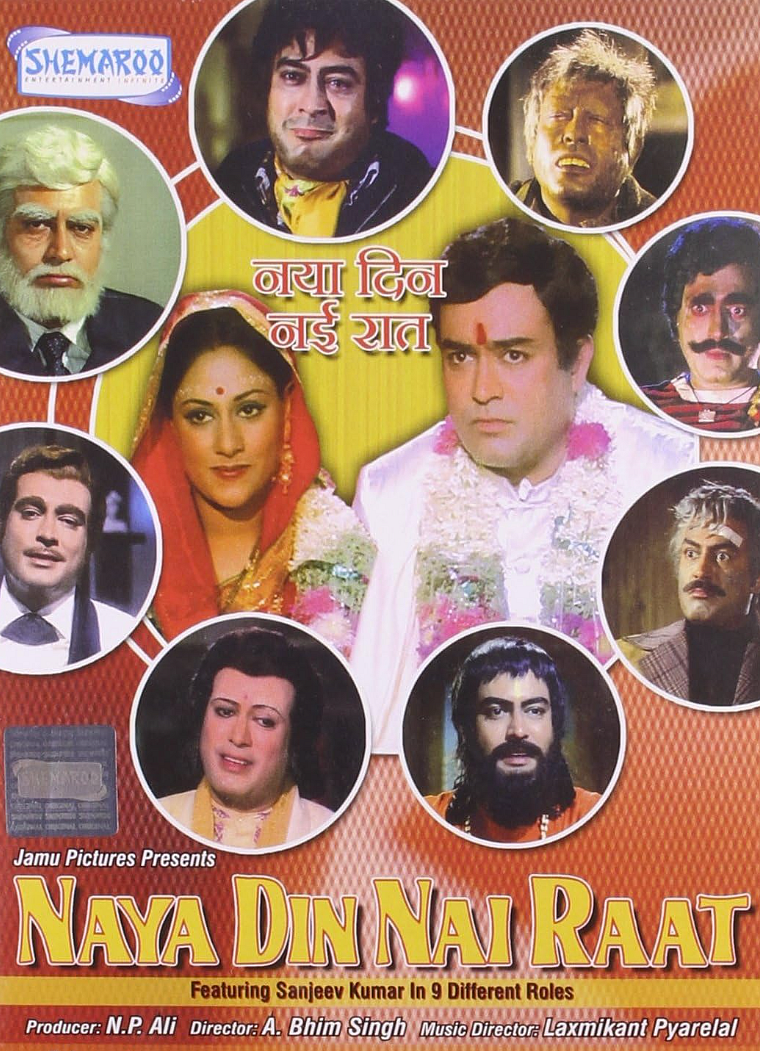
Pandit, who was assigned the responsibility of driving Sanjeev Kumar to the Raahee set and dropping him back home after the shoot, was soon also bringing him Kashmiri vegetarian dishes, which his mother cooked and the actor relished. “Once, when I forgot to get the dabba, he sent me back home. While my mother grumbled over the extra cooking, my father was excited that Sanjeev Kumar was having our ghar ka khana (home cooked food),” the filmmaker reminisces.
The actor didn’t just love food. According to Verma, he loved chatting while others ate even more. The DoP, who also directed a Hindi film, Kadambari, featuring Shabana Azmi and Vijay Arora in 1976, recalls that during the Fauji Chacha shoot, after a long day of work, some of them dropped in at the actor’s Mumbai residence. He insisted they sit down to a “light meal”, which began with soup, followed by snacks, then four kinds of sabzi (curries), a couple of desserts and finally, drinks.
By the time they finished, it was past midnight. And it wasn’t over yet. “Hari Bhai, who looked perfectly fresh, said, ‘Now, we will have the real dinner.’ That was his charm—food, laughter and conversation, all in endless supply,” chuckles the veteran.

Pandit concurs, flashbacking to when some girls, including the late Satish Shah’s wife Madhu, had dropped by the Raahee set. Sanjeev Kumar observed them and when Pandit went to brief him for a shot, asked about his visitors. “I told him they were young actresses from SNDT and Sophia College whom I directed in plays. And he remarked in a deadpan way, ‘Hmmm, I didn’t take you too seriously till now, but with beautiful girls coming to meet you, it seems you have a bright future.’ His sense of humour was lajawaab (priceless)!” the filmmaker guffaws at the memory.
Verma informs that in one scene in Fauji Chacha, Kumar had to gently hold the heroine’s hand and say a single line of dialogue. But every time the camera rolled, he missed his cue. After the third retake the actress, Madhushala, teased him gently, saying, “You keep forgetting your timing.” Smiling, he admitted that he remembered his cue, “I just like the rehearsals” and everyone present burst out laughing. When the director scolded him for deliberately muffing up takes, he retorted, “Tell me honestly, would you hurry through a scene if you were holding hands with this heroine?” Touche!
On another occasion, when the assistant director reprimanded the Late Lateef for strolling in at 4 pm for a 9 am shoot, he offered the weak excuse that “Time just moves too fast when I sleep,” then read the scene once, and delivered it in one single, flawless take. As he walked away, he quipped impassively, “Now see, one shot, seven hours early for tomorrow!”
The man, Verma reiterates, was a genius, remembering how once while shooting in a small town, when the costume boy forgot to bring his shirt for the next scene, Kumar picked up a kurta lying around. It was old, torn, without even a collar, but overriding the director, he wore it half buttoned, changing the mood of the scene and reasoning that the character anyway couldn’t afford a collar.
After it was okayed, when director Dharam Kumar gushed, “That’s what I call method acting!” Verma shot back, “No, that’s what I call resourceful laziness.” Kumar, who overheard the exchange, smiled at them saying, “Both work equally well in cinema.”

He himself was not a method actor. He did not believe in months of prep or too many rehearsals. “Hari Bhai would casually face the camera and masti karte karte (while he was having fun) just ‘lived’ the character,” asserts an awed Pandit, adding that he was also blessed with an elephant’s memory, which made dubbing with him a smooth process.
Unfortunately, Kumar had inherited a congenital heart condition that had taken away his young brother, Nakul, prematurely, and put the fear of God into him. He wanted a home of his own, and a wife to share it with, but his malady deprived him of both. After a heart attack, he had rushed to the US and undergone a bypass surgery, and was still ailing when he returned to work.
“During Raahee’s last schedule, we could all see that Hari Bhai was unwell, but he was determined to complete the film. His suits were hanging from him because he was painfully thin now. Raman ji took only close-ups of him so no one watching the film would guess how ill he was. A day after he wrapped up our shoot, he passed away,” Pandit sighs.
On November 6, 1985, Kumar suffered a second massive attack. He was just 47, too young to take his final curtain call.








